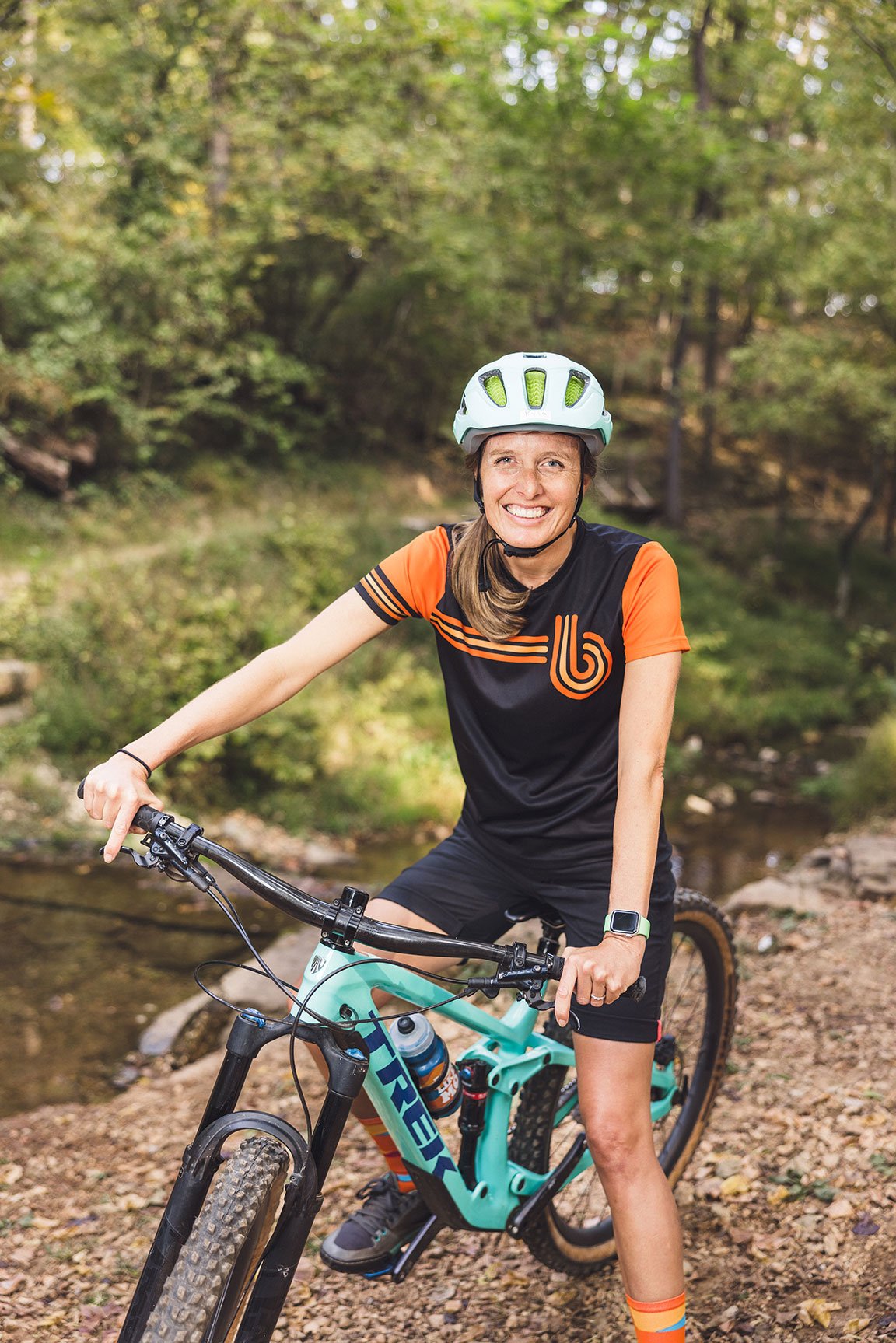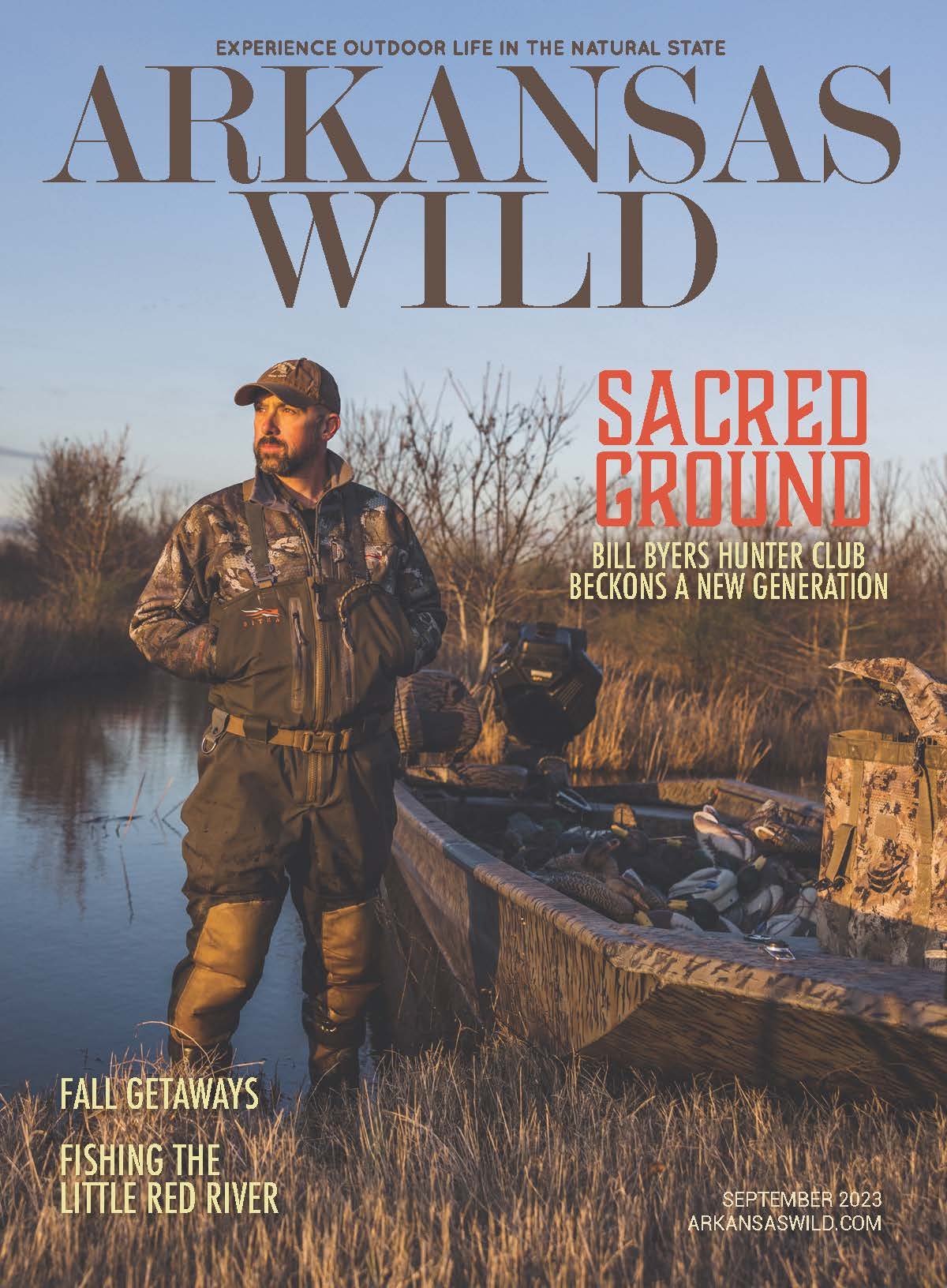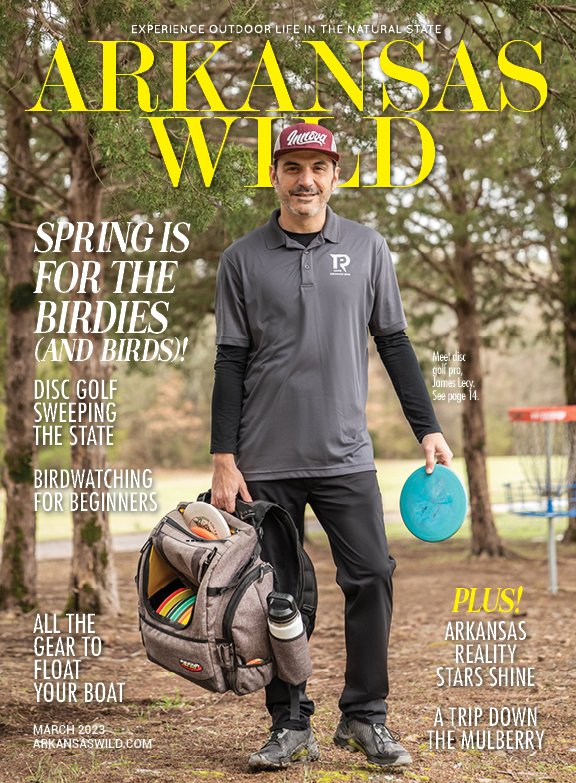“It takes a village” is a popular phrase underscoring the individual responsibility each of us has for maintaining the health and vitality of our communities. It’s equally true in what is demanded of us in keeping our wild spaces pristine and unspoiled.
But while we all have a role to play, some of us rise to a higher level of advocacy and service, devoting time, talent and treasure in ways that benefit us all. Often overlooked and rarely thanked, these dedicated souls work behind the scenes to improve access, protect habitat and promulgate new generations of outdoors enthusiasts.
We call them Champions of the Wild.
By Dwain Hebda Photography by Novo Studio
KYLA TEMPLETON
Bike School Bentonville
Kyla Templeton is a familiar sight on local trails.
You don’t have to spend much time in Northwest Arkansas — or Bentonville in particular — to recognize cycling is king around here, especially mountain biking. Yet to Kyla Templeton’s way of seeing things, the community has only scratched the surface of its true potential as a cycling mecca.
A native of Oklahoma City, Templeton moved to Bentonville after college to work for Walmart. Her own personal experience getting turned on to cycling provides a touchpoint for the many people she’s helping enjoy the activity.
“The summer before my last semester of college, I bought a mountain bike,” she said. “I had an internship at UPS in Dallas, and I rode this mountain bike for a week or two before I was like, ‘I think I want a road bike.’ I just loved to ride, especially with a group of my girlfriends. I found a lot of joy.”
Templeton has been at the heart of promoting and expanding cycling by lowering barriers to participation for all. She founded Girls Bike Bentonville in 2012 to help increase road cycling among women. In 2015 she co-founded and, until last year, led Arkansas’s chapter of the National Interscholastic Cycling Association, a group targeting middle and high schoolers that provides guidance on holding mountain biking competitions, certifying coaches and growing grassroots networks of cycling clubs. Most recently, she founded Bike School Bentonville, a for-profit entity that teaches people how to ride the trails.
All three ventures, she said, are rooted in the same basic premise of expanding ridership and improving the experience, channeled through different audiences.
“Girls Bike Bentonville was designed to help empower women to have community and do something fun and healthy together,” she said. “Women have a tendency to need instruction and I think they kind of need somebody to tell them they can do it, in ways that men don’t.
“With NICA, the goal was to get schools involved because we know schools bring access. Our role was to train and support coaches and to empower them with programming such as racing or girls’ programming or stewardship programming in order to motivate kids to want to join and participate.”
In both cases, Templeton’s leadership drove impressive results. Girls Bike Bentonville’s group rides would grow to attract 45 riders or more per outing while more than 1,200 individuals made up the group’s Facebook page. The NICA venture enjoyed similar success, growing at an average rate of 10-15% per year. Now, as she turns her attention to Bike School Bentonville, which she co-founded with Nat Ross, she’s got similarly ambitious goals in mind.
“The goal of Bike School Bentonville is to be like ski school, but for mountain bikes,” she said. “We’ve built this community around trails, and people come to Bentonville because they want to mountain bike. People have been talking about we’re going to have Olympians coming out of Bentonville because our trails are so good. Well, that sort of development doesn’t just happen; you have to have people who can cultivate and coach others, especially young people.
“We’re developing coaches by partnering with the National Center for Youth Development. They’ve helped us build our curriculum for the younger kids’ programming and helped train our coaches.”
Asked what the best part of all this has been, the mother of two boys said watching families bond through cycling has been rewarding.
“The wonderful thing about cycling is it gets the whole family involved and it has the potential to transform families, giving them a quality activity to spend time doing together,” she said. “It transforms whole communities when people get behind it.”
LOWELL MYERS
Sore Lip ’Em All
Lowell Myers surveys the trout stream.
As long as Lowell Myers can remember, fly-fishing has been a part of his life. He’s been at it so long, he can’t recall precisely who taught him, though odds are, he said, it was his older brother. Regardless, it feels like he was born with a rod in one hand and a hand-tied nymph in the other.
“I grew up in Northeast Arkansas in Biggers, near Jonesboro,” he said. “Grew up in an outdoors family, hunted and fished all the time. I started fly-fishing at an early age and it stuck with me. I enjoy being on the water.”
Like a lot of people, the sport gave Myers a welcome respite from the modern world. But unlike most people, the pull of the trout was enough to take over his professional life. After stints in youth ministry and business administration, he surrendered to his passion for fishing and began guiding 20 years ago.
Sore Lip ’Em All, of which he is operator, grew out of Myers’ relationship with Trout Magnet founder Jeff Smith. Through the guiding business, he gets to pass his enthusiasm on to others.
“As guides, we encounter people who’ve never held a fly rod or a spinning rod or anything,” he said. “To see them gain an interest in being outdoors and being able to help them catch their first trout is one of the really rewarding things about this business.”
Given the nature of his livelihood, Myers became keenly aware of the need to maintain habitat, leading him to devote considerable time to conservation groups. He’s a past president and past board member of Trout Unlimited and past president and current board member for the Little Red River Foundation, to name a couple.
“Some of the things we accomplished, we enhanced the Little Red River cleanup,” he said. “It was already going on, but we tried to bring more attention to that during my time at Trout Unlimited. One year, we had over 200 volunteers gather on a particular Saturday. That’s exciting for me to see that many volunteers.
“Through the Little Red River Foundation, we petitioned Arkansas Game and Fish and received approval to plant cutthroat eggs in the Little Red River, which had never been done before. The only eggs that had been planted previously were brown trout eggs in the early ’70s. We did that three years ago and we’re hoping to do that again in the next couple of years and hopefully in the future to provide another species of trout in this river.”
Myers has also been instrumental in efforts to introduce young people to the sport of fly-fishing.
“When I was with Trout Unlimited we helped kids learn how to cast and fly-fish and that was very rewarding,” he said. “In the past, our guide service has helped out with Boy Scouts to help them earn their merit badge.”
Myers said the issues facing Arkansas trout fishing today are byproducts of the state’s enhanced reputation for good fishing. While popularity is a positive, he said, continued diligence is required to maintain the quality of trout fishing here for present and future generations.
“Arkansas is getting to be known as a destination for trout, that’s for certain,” he said. “Any body of water anywhere, whether it be in Maine, Alaska, the Rocky Mountains or anywhere in between, is going to have challenges. There are still some improvements to be made in Arkansas that will better protect what we have and hopefully improve it for the future, leaving it better than what we have now.”
Dr. Douglas Osborne on site at Five Oaks.
DR. DOUGLAS OSBORNE
UAM/Five Oaks Ag Research & Education Center
As a professor in the College of Forestry, Agriculture and Natural Resources at the University of Arkansas-Monticello, Dr. Douglas Osborne educates students in subject matter ranging from wildlife management and conservation to wetland and landscape ecology and management. The topics are all close to the Illinois native’s heart.
“I love figuring out what these students are good at, what their weaknesses are and where they want to go in life,” he said. “Just that interaction, that next level of mentoring students and seeing them move into careers, fulfills me.”
Osborne enjoys what he does on the UAM campus so much, it’s hard to imagine anything that could top it. That was until the opportunity came along to lead the Five Oaks Ag Research and Education Center, a cutting-edge educational program set in one of the Grand Prairie’s most storied and ecologically progressive duck clubs.
“I don’t know if I’ve ever told anybody ‘no’ in my life, and I wasn’t going to start with this,” he said.
The brainchild of Five Oaks owner George Dunklin, the 2-year-old Ag Research and Education Center is the state’s boldest educational initiative yet in preparing the conservationists and land management professionals of tomorrow.
“The economics behind the waterfowl in the state are really important,” Osborne said. “The hunting heritage alone in terms of waterfowl in Arkansas is just tremendous; many generations of people have grown up waterfowl hunting. It’s important for the state to maintain healthy hunting populations.
“At the same time, the habitats are declining because the trees are dying. We’ve got poor forest conditions now because of changes in hydrology. We’re trying to better understand these systems and how we can manage them differently to promote healthy forests which are, ultimately, healthy habitat for ducks. We’ve got several research projects going looking at forest health, duck populations, duck migration and movement.”
As program director, Osborne oversees students in the one-year paid graduate certificate program. They live and work at Five Oaks while learning firsthand about ecosystems and issues related to conservation.
“They’re out on the land every day, either with me learning about ecology and waterfowl habitat or with [UAM’s] aquatics professor learning how to identify aquatic insects which are important food sources for ducks. They’re also out on tractors or moving water around the farm to flood and irrigate different waterfowl habitats.”
The program draws students from across the United States, all of whom get an eye-opening experience in the living lab.
“Students typically learn about this sitting in a classroom, but to actually put their hands on it and do it themselves is unique,” Osborne said. “In a classroom, you get lectures each week and maybe have a two-hour lab once a week, but these kids are getting the chance to actually turn the generators on and start pumping the water out of the ditches or opening water control structures and moving water themselves.”
As the product of a rural upbringing, and a lifelong duck hunter besides, Osborne relates to the program on several levels. He sees the curriculum both as having an immediate impact and holding the potential to make Arkansas the center of the land management and conservation studies universe.
“After our first year, two of our graduates went to grad school, one got a private land job in Arkansas and a fourth student got hired by Ducks Unlimited as a biologist in Colorado,” he said. “In every case, they were recognized for the skill set they gained from the program by working as apprentices, in a manner of speaking. It took their education and experience to the next level.”
Sam Ellis and Grizzly Bear get ready for a paddle.
SAMUEL ELLIS
Rock Town River Outfitters
If Samuel Ellis had listened to most of what he was told his whole life, there never would have been a Rock Town River Outfitters, particularly as it pertained to the state’s namesake river.
“I was always told growing up that the Arkansas River is very dangerous, don’t go anywhere near it,” he said. “I kind of questioned that and started going out by myself on the water to explore the Little Maumelle and the Arkansas.”
To be fair, Ellis wasn’t your ordinary paddler, having spent time as a professional whitewater rafting guide in Colorado where he’d take tourists out on the wilder northern reaches of the Arkansas River. He returned home with advanced boating skills and a thirst for exploring the waterways of his home state
“The Arkansas River used to be very dangerous, before they built Murray Lock and Dam,” he said. “But these days you can look at the water flow on an app before you even get out of bed to see if it’s safe or not.”
Having seen the potential for river tourism in Colorado, Ellis started to think about how he could leverage the once-taboo Arkansas River into a business. In 2017, he spent his life savings on three kayaks and started taking groups on guided paddling tours as a side gig.
Rock Town River Outfitters’ first year was hand-to-mouth, but the steady demand for tours told Ellis he was onto something. In 2018 a prime River Market location opened in the former Bobby’s Bike Hike space. Ellis took a leap of faith and hasn’t touched down yet, adding paddle boards, bike rentals and guided bike tours to the mix and opening a Two Rivers location in 2019.
“We do sunset tours every Friday and Saturday, usually between eight and 10 people,” he said. “We started doing corporate events and groups; we can put about 50 people in the water right now.
“We also do a pedal-paddle package that’s gained a lot of interest. People can hop on a bike rental in our River Market location, ride to our Two Rivers location off River Mountain Road, hop in a kayak rental for two hours and bike back downtown to grab lunch or dinner. It’s been really cool watching people view and experience this much of Little Rock without touching a steering wheel.”
With each tour Ellis educates people on the positive attributes of the Arkansas River. He said he knew he was making headway when the percentage of locals grew level with the number of out-of-towners.
“Originally it was mostly tourists; most of Central Arkansas was still under the impression that the Arkansas River was dangerous and you shouldn’t be on it,” he said. “When COVID hit, everybody was locked up in their house and looking for something to do. That’s when we really finally got the trust and support of local people here in Little Rock.”
Ellis has also become a key player in wider efforts to promote the area. The Little Rock Convention and Visitors Bureau regularly uses him to show off the area to visiting travel writers and other influencers. Realizing a rising tide lifts all kayaks, he’s happy to participate in marketing his hometown.
“Little Rock’s not on a lot of people’s bucket list, let’s just be honest,” he said. “But I love it when people come and find us to rent a bike or kayak and they come back and their first words are, ‘I really underestimated Little Rock. This is wonderful.’ That’s a great feeling knowing that I’m getting to showcase Little Rock and to represent it as a really fun outdoor recreation spot.”







